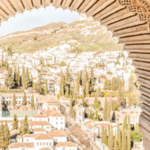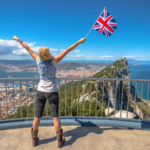Rami & Estefanía
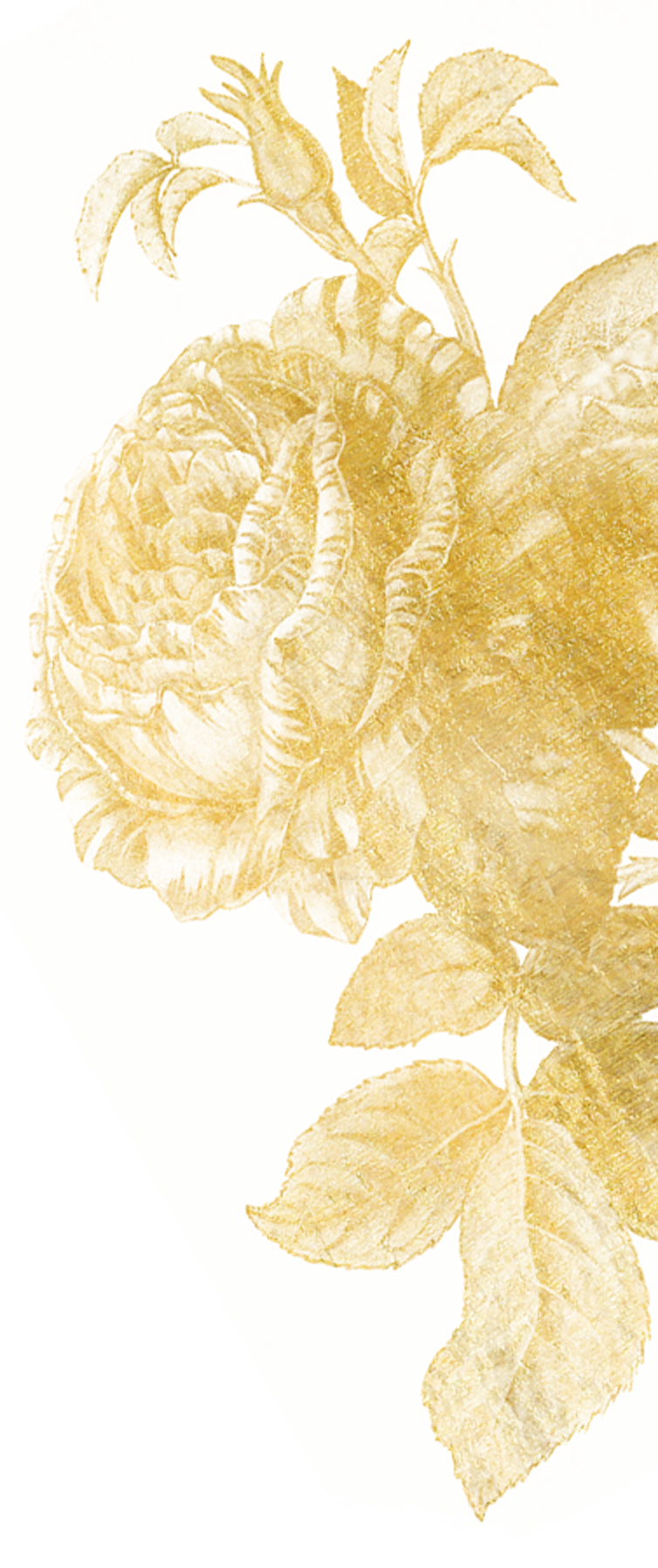

Things To Do/Turismo
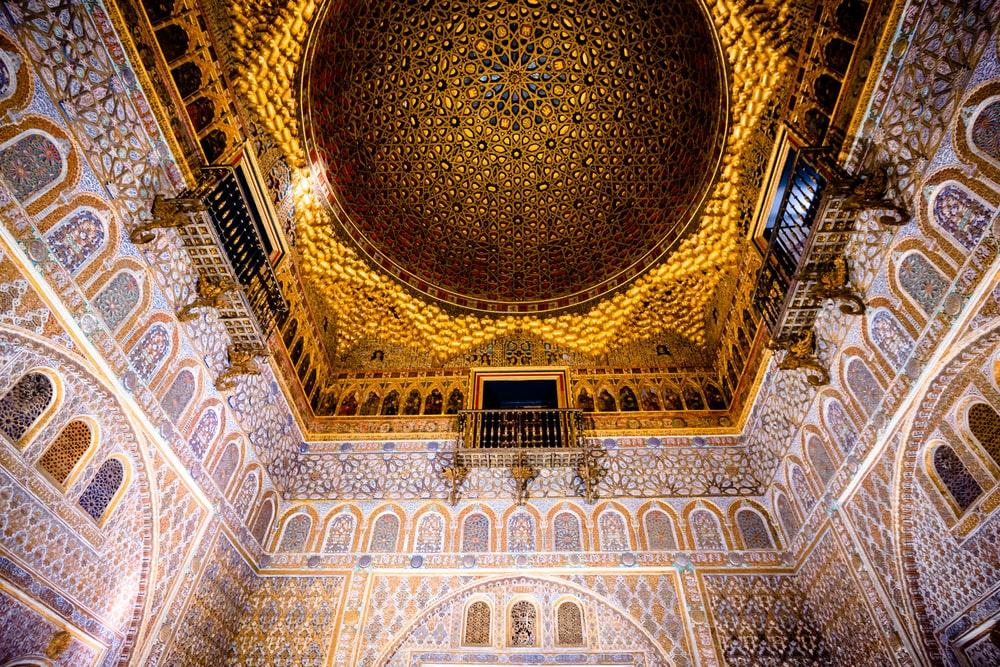
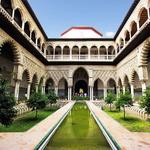
Royal Alcázar de Sevilla (Alcazar of Seville)
Beautiful medieval Islamic palace showcasing a unique fusion of Spanish Christian and Moorish architecture. The Royal Alcázars of Seville, historically known as al-Qasr al-Muriq and commonly known as the Alcázar of Seville, is a royal palace in Seville, Spain, built for the Christian king Peter of Castile. It was built by Castilian Christians on the site of an Abbadid Muslim alcazar, or residential fortress. Open times: 9:30 AM - 5:00 PM Hermoso palacio islámico medieval que muestra una fusión única de la arquitectura española cristiana y morisca. Los Reales Alcázares de Sevilla, históricamente conocidos como al-Qasr al-Muriq y comúnmente conocidos como el Alcázar de Sevilla, es un palacio real en Sevilla, España, construido para el rey cristiano Pedro de Castilla. Fue construido por cristianos castellanos en el sitio de un alcázar musulmán abbadid o fortaleza residencial. Horario: 9:30 a. m. - 5:00 p. m.
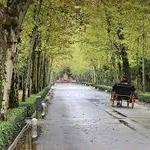
El Parque de María Luisa (María Luisa Park)
María Luisa Park is a public park that stretches along the Guadalquivir River in Seville, Spain. It is Seville's principal green area. The park is home to many monuments and to numerous ponds and fountains.The Plaza de España was a principal building built on the park's edge to showcase Spain's industry and technology exhibits. The complex is a huge half-circle with buildings continually running around the edge accessible over the moat by numerous beautiful bridges. El Parque de María Luisa es un parque público que se extiende a lo largo del río Guadalquivir en Sevilla, España. Es la principal zona verde de Sevilla. El parque alberga muchos monumentos y numerosos estanques y fuentes. La Plaza de España fue un edificio principal construido en el borde del parque para exhibir exhibiciones de la industria y la tecnología de España. El complejo es un enorme semicírculo con edificios que se extienden continuamente alrededor del borde accesible sobre el foso por numerosos puentes hermosos.
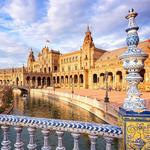
Plaza España (The Plaza de España)
The Plaza de España is a plaza in the Parque de María Luisa, in Seville, Spain, built in 1928 for the Ibero-American Exposition of 1929. It is a landmark example of the Regionalism Architecture, mixing elements of the Baroque Revival, Renaissance Revival and Moorish Revival styles of Spanish architecture. La Plaza de España es una plaza en el Parque de María Luisa, en Sevilla, España, construida en 1928 para la Exposición Iberoamericana de 1929. Es un ejemplo histórico de la Arquitectura Regionalista, mezclando elementos del Renacimiento Barroco, Renacimiento Renacentista y los estilos neomoriscos de la arquitectura española.
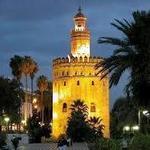
Torre del Oro (The Golden Tower)
The Torre del Oro is a dodecagonal military watchtower in Seville, southern Spain. It was erected by the Almohad Caliphate in order to control access to Seville via the Guadalquivir river. Constructed in the first third of the 13th century, the tower served as a prison during the Middle Ages. La Torre del Oro es una atalaya militar dodecagonal en Sevilla, sur de España. Fue erigido por el califato almohade para controlar el acceso a Sevilla por el río Guadalquivir. Construida en el primer tercio del siglo XIII, la torre sirvió como prisión durante la Edad Media.
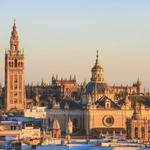
Catedral de Sevilla (Seville Cathedral)
The Cathedral of Saint Mary of the See, better known as Seville Cathedral, is a Roman Catholic cathedral in Seville, Andalusia, Spain. It was registered in 1987 by UNESCO as a World Heritage Site, it is the fourth-largest church in the world as well as the largest Gothic church. After its completion in the early 16th century, Seville Cathedral supplanted Hagia Sophia as the largest cathedral in the world, a title the Byzantine church had held for a thousand years Opening hours (Monday: 11:00 -15:30. Tuesday -Saturday: 11:00 - 17:00) La Catedral de Santa María de la Sede, más conocida como Catedral de Sevilla, es una catedral católica romana en Sevilla, Andalucía, España. Fue registrado en 1987 por la UNESCO como Patrimonio de la Humanidad, es la cuarta iglesia más grande del mundo, así como la iglesia gótica más grande. Horario (Lunes: Entradas: 11:00 -15:30. Martes - Sábado: Entradas: 11:00 - 17:00)
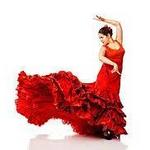
Disfruta un show the Flamenco (Enjoy Flamenco in Seville)
Flamenco is music, singing, dancing, poetry, feeling... and a whole vital philosophy. Discover the authenticity and meaning within this incomparable demonstration of popular art. Flamenco is surely the purest expression of Andalusian folklore. They say it began with the fifteenth-century arrival of the gypsies to the Cadiz countryside of Jerez and Seville. In the middle of the nineteenth century, it was popularized through the flamenco bars. The first of these flamenco bars opened in Seville around 1885. Flamenco es música, cante, baile, poesía, sentimiento... y toda una filosofía vital. Descubre la autenticidad y el significado de esta incomparable demostración de arte popular. El flamenco es seguramente la expresión más pura del folclore andaluz. Dicen que comenzó con la llegada de los gitanos en el siglo XV a la campiña gaditana de Jerez y Sevilla. A mediados del siglo XIX se popularizó a través de los bares flamencos.
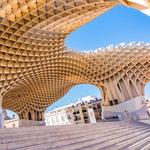
Las Setas De Sevilla (The Mushrooms of Seville)
Sculptural wooden structure with an archaeological museum, rooftop walkway & viewpoint. Setas de Sevilla, initially titled Metropol Parasol, is a wooden structure located at La Encarnación square in the old quarter of Seville, Spain. It was designed by the German architect Jürgen Mayer and completed in April 2011. Estructura de madera escultórica con un museo arqueológico, una pasarela en la azotea y un mirador. Setas de Sevilla, inicialmente titulada Metropol Parasol, es una estructura de madera ubicada en la plaza de La Encarnación en el casco antiguo de Sevilla. Fue diseñado por el arquitecto alemán Jürgen Mayer y terminado en abril de 2011
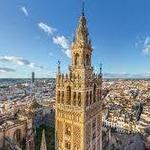
La Giralda (The Giralda)
The Giralda is the bell tower of Seville Cathedral in Seville, Spain. It was built as the minaret for the Great Mosque of Seville in al-Andalus, Moorish Spain, during the reign of the Almohad dynasty, with a Renaissance-style top added by the Catholics after the expulsion of the Muslims from the area. La Giralda es el campanario de la Catedral de Sevilla en Sevilla, España. Fue construido como alminar de la Gran Mezquita de Sevilla en al-Andalus, España musulmana, durante el reinado de la dinastía almohade, con una parte superior de estilo renacentista añadida por los católicos tras la expulsión de los musulmanes de la zona.
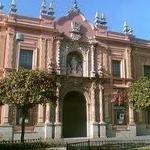
Museo De Bellas Artes De Sevilla (Seville Museum of Fine Arts)
The Museum of Fine Arts of Seville or Museo de Bellas Artes de Sevilla is a museum in Seville, Spain, a collection of mainly Spanish visual arts from the medieval period to the early 20th century. El Museo de Bellas Artes de Sevilla o Museo de Bellas Artes de Sevilla es un museo en Sevilla, España, una colección de artes visuales principalmente españolas desde la época medieval hasta principios del siglo XX.
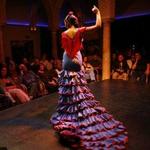
Museo del Baile Flamenco (Flamenco Dance Museum)
18th-century building housing museum detailing flamenco dancing history & culture, plus live shows. Edificio del siglo XVIII que alberga un museo sobre la historia y la cultura del baile flamenco, además de espectáculos en directo.
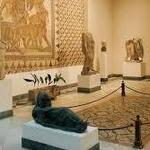
Museo Arqueológico de Sevilla (Archeological Museum)
The Archeological Museum of Seville is a museum in Seville, southern Spain, housed in the Pabellón del Renacimiento, one of the pavilions designed by the architect Aníbal González. These pavilions at the Plaza de España were created for the Ibero-American Exposition of 1929. El Museo Arqueológico de Sevilla es un museo en Sevilla, sur de España, ubicado en el Pabellón del Renacimiento, uno de los pabellones diseñados por el arquitecto Aníbal González. Estos pabellones de la Plaza de España fueron creados para la Exposición Iberoamericana de 1929.
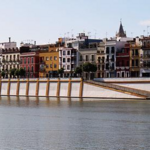
Barrio Triana (Venture over the river to Triana)
Down-to-earth Triana is anchored by the Mercado de Triana, a lively market hall near the arched Puente de Isabel II bridge, with food stalls and small eateries serving salmorejo soup, croquettes and other tapas. By the river, Calle Betis has more restaurants and bars, plus venues presenting live flamenco music. Shops selling ceramics cluster around the Centro de la Cerámica Triana, a museum about the craft. La sencilla Triana está anclada en el Mercado de Triana, un animado mercado cerca del puente arqueado Puente de Isabel II, con puestos de comida y pequeños restaurantes que sirven sopa de salmorejo, croquetas y otras tapas. Junto al río, la calle Betis tiene más restaurantes y bares, además de locales que presentan música flamenca en vivo. Las tiendas que venden cerámica se agrupan alrededor del Centro de la Cerámica Triana, un museo sobre la artesanía.
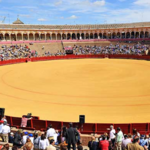
Plaza de Toros
Plaza de Toros de la Real Maestranza' is the largest bullfighting arena in Spain. Located in the impressive 18th-century bullfighting arena Plaza de Toros de Sevilla is the 'Museo Taurino', a museum on the history of bullfighting in Seville. La Plaza de Toros de la Real Maestranza es la plaza de toros más grande de España. Ubicado en la impresionante plaza de toros del siglo XVIII, Plaza de Toros de Sevilla, se encuentra el 'Museo Taurino', un museo sobre la historia de las corridas de toros en Sevilla.
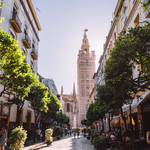
Santa Cruz District & Old Town
The district of 'Santa Cruz' is the old Jewish quarter. This historic city centre includes important sights such as the Alcazar Palace and the Cathedral. Here, you can wander through a maze of narrow streets, terraces and numerous restaurants. Despite the many tourists, the historic center is a must do during your city trip to Seville. El barrio de 'Santa Cruz' es la antigua judería. Este centro histórico de la ciudad incluye importantes lugares de interés como el Palacio del Alcázar y la Catedral. Aquí, puedes pasear por un laberinto de calles estrechas, terrazas y numerosos restaurantes. A pesar de la gran cantidad de turistas, el centro histórico es una visita obligada durante su viaje a la ciudad de Sevilla.
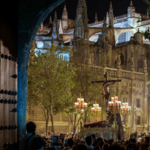
Semana Santa (Holly Week in Seville)
Happening the week prior the wedding. The Holy Week processions in Seville are Spain’s most famous. From Palm Sunday to Easter Sunday sombre penitents will march through the streets wearing sandals, robes and those slightly eerie pointed hoods.These groups belong to brotherhoods attached to churches across the city and will carry large and very decorative floats portraying passion scenes and weeping Virgins. Everything builds up to Maundy Thursday, when the city’s central plazas put up grandstand seating and women attending even dress in black. On this night the processions make their steady way around the centre until the morning. Pasando la semana antes de la boda. Las procesiones de Semana Santa en Sevilla son las más famosas de España. Desde el Domingo de Ramos hasta el Domingo de Resurrección, los penitentes sombríos desfilarán por las calles con sandalias, túnicas y esas capuchas puntiagudas un poco espeluznantes.
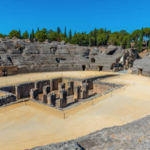
Italica
Get on a bus at the station at Plaza de Armas and within half an hour you’ll be at the birthplace of the Roman Emperors Trajan and Hadrian. Also a key filming site for Games of Thrones. Italica is a massive archaeological site, the highlight of which is the amphitheatre. This seated 25,000 spectators in its heyday, and you can nose around the tunnels beneath the terraces of seating, and see the subterranean structure at the centre of the arena. On what would have been the seats of the ancient city are the foundations of mansions and temples, where complete mosaics can still be seen. Súbete a un autobús en la estación de Plaza de Armas y en media hora estarás en el lugar de nacimiento de los emperadores romanos Trajano y Adriano. También es un sitio de filmación clave para Games of Thrones. Italica es un sitio arqueológico masivo, cuyo punto culminante es el anfiteatro.
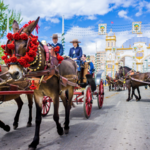
Feria de "Abril" Sevilla
The week following the wedding the Feria de Abril starts! Southwest of Seville, in Los Remedios, are the fairgrounds where this five-day event takes place, beginning on the Tuesday and wrapping up with fireworks on the Sunday. The scene will almost knock you off your feet, where some thousand tents are erected and guys and girls go around in traditional costume. The women will wear the “traje de gitano”, typical polka dot flamenco dresses, while many men will wear the short waistcoats and wide-brimmed hats. During the Fair people will eat, drink and dance traditional Sevillanas until dawn. La Feria de Abril de Sevilla comienza la noche del “alumbrao”, momento inaugural en el que se encienden las luces del recinto ferial. También esta noche se degusta el tradicional “pescaíto frito” en las casetas. La Feria es como una pequeña y engalanada ciudad. Un mundo efímero donde las casas son casetas, la iluminación se consigue con farolillos.
Bar: Patio San Eloy
Cocktail Bar: Le XiX
Bar: La Linterna Ciega
Tapas, craft beers & wines are served in this trendy restaurant with a small furnished terrace.
Bar: Urbano Comix
Wide-ranging beers served amid vintage decor & colorful lighting, plus pool, pinball & retro games.
Bar Alfalfa
Relaxed tavern supplying drinks & housemade small plates in a compact space that has a rustic flair.
Bar Triana
Creative tapas plates, beer & wine served in a cozy setting with colorful tiles & a patio.
Pura Vida Terraza
Lively, casual rooftop cocktail spot with a pool, plus beer, wine & elevated pub fare. Excellent views.
Abades Triana Restaurante
Abades Triana is located on Calle Betis in Seville, next to the Guadalquivir River and opposite the Torre del Oro, in the popular Barrio de Triana. Its spectacular panoramic window in the living room makes it the perfect enclave to discover the river as the protagonist and contemplate the Torre del Oro, the Giralda and the Maestranza.
La Cayetana Restaurant
Andalusian Restaurant
El Restaurante Cañabota
Informal restaurant/bar offering elevated seafood & tasting menus in a white-tiled interior.
Espacio Eslava Restaurant
A classic restaurant packed with flavors in the heart of San Lorenzo Neighborhood
Bar: Abaceria del Postigo
Tapas bar
Sobretablas Restaurante
Bright, stylish spot serving inventive & refined modern Spanish fare, with natural & organic wines.
Bodega Palo Santo Restaurant
Traditional tapas, beer & sangria at a bright, low-key bar & dining room with street tables.
De La O Restaurant
Fine dinning experience. A locally sourced menu of Andalusian meat & fish dishes is served in nature-inspired surrounds.
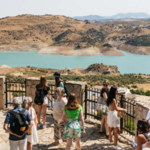
Pueblos Blancos and Ronda- Day Trip
Travel through the ancient Andalusian kingdoms of Castille and Granada, while enjoying the natural beauty and learning about the region’s history. Visit the white villages, the Grazalema forest and mountains, and the ancient town of Ronda. Ronda is one of the oldest towns in Spain, built on two separate cliffs which are connected by Spain's most famous bridge - New Bridge, built in the 18th century.
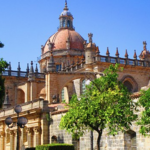
Jerez de la Frontera- Day Trip
Jerez de la Frontera, usually called Jerez, is a city in southern Spain's Andalusia region, about an hour away from Seville. Its old quarter surrounds the Alcázar de Jerez, a Moorish fortress founded in the 11th century. The Royal Andalusian School of Equestrian Art is a famed riding school with horse shows and a carriage museum. The city is also known for flamenco music and sherry production in the so-called Sherry Triangle lying to the west.
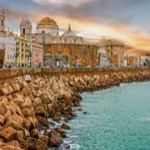
Cádiz
Cádiz is a province of southern Spain, in the southwestern part of the autonomous community of Andalusia. It is the southernmost part of mainland Spain, as well as the southernmost part of continental Europe. If you are looking for beach, this is a great choice only an hour and 30 min from Seville.
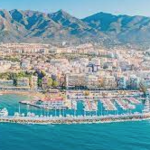
Marbella
Marbella is a city and resort area on southern Spain’s Costa del Sol, part of the Andalusia region. The Sierra Blanca Mountains are the backdrop to 27 km of sandy Mediterranean beaches, villas, hotels, and golf courses. West of Marbella town, the Golden Mile of prestigious nightclubs and coastal estates leads to Puerto Banús marina, filled with luxury yachts, and surrounded by upmarket boutiques and bars. Only 2 hours and 30 min from Seville.
